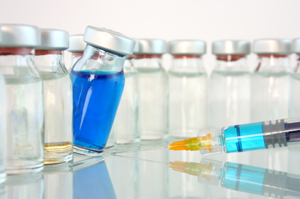Your basket is currently empty!
Liposomes-deliver
Liposomes deliver an immune hit to cancer cells
ProImmune technology used to evaluate patient responses in first-in-man trials of a cancer vaccine
Berinstein, NL. et al. 2012. First-in-man application of a novel therapeutic cancer vaccine formulation with the capacity to induce multi-functional T cell responses in ovarian, breast and prostate cancer patients. Journal of Translational Medicine. 10(1):156.
Many solid tumours present a different range of antigens on their cell surfaces to those presented by healthy tissue. This renders them susceptible to attack from the immune system; a response to these tumour-associated antigens (TAA) can be sufficient to restrict tumour growth, shrink or even eradicate the tumour. Cancer immunotherapies are designed to promote or augment immune responses to TAA, and one strategy is to supply extra peptide TAA through vaccination.
The challenge with peptide-based cancer vaccines is to deliver peptides so as to make them as immunogenic as possible. Scientists at Immunovaccine in Canada designed a cancer vaccine based on seven TAA initially isolated from an ovarian cancer cell line and now known to be presented by breast, prostate and ovarian tumours. To verify that the peptides were likely to be immunogenic, they tested the strength of the interaction between peptide and MHC using ProImmune’s REVEAL® MHC-peptide binding assays. Peptides that interact strongly with MHC are likely to perform well as epitopes and support the generation of an immune response. All seven of the Immunovaccine peptides bound strongly to HLA-A*02:01 compared to ProImmune’s control peptides, confirming that they were a good choice to take forward as a vaccine for HLA-A*02:01-positive cancer patients. To further enhance the immunogenicity of their peptide mixture, Immunovaccine included a polynucleotide-based adjuvant and a universal T helper peptide from tetanus toxoid.
Writing in Drug Development & Delivery in early 2012, Immunovaccine CSO Dr. Marc Mansour observed that
“One of the primary problems researchers face in developing effective cancer vaccines is trying to effectively introduce cancer antigens into a patient’s body to trigger the immune system”. |
 |
Even with highly immunogenic peptides, more is needed to trigger an immune response, particularly in cancer patients where the immune system can be depressed.
Immunovaccine are working with a liposome-in-oil formulation they have patented as DepoVax™ to improve delivery of their peptide antigens. Their idea is that peptides delivered in this way are easier for antigen-presenting cells to take up and present to the immune system. DepoVax™ formulated with the peptides and adjuvant described above was recently tested in a first-in-man trial, and the results, published in the Journal of Translational Medicine show great promise.
23 HLA-A*02:01-expressing cancer patients (with a mixture of breast, ovarian and prostate cancers) were recruited to the study. They were vaccinated three times over the course of three weeks, and the resultant immune response was monitored closely. Immunovaccine asked ProImmune to manufacture Pro5® Pentamers matching each of their 7 chosen TAA so that they could follow any increase in antigen-specific T cell numbers. A 2-fold increase in the number of antigen-specific T cells from patients detected after ex vivo peptide stimulation, measured by Pro5® Pentamer staining, was considered positive. Intracellular cytokine staining and in some cases IFNɣ ELISpot assays were also used to study immune responses. Taken together, results showed that about two-thirds of patients evaluated had increased TAA-specific immunity as a result of vaccination.
While the study was too small and of too short a duration to measure a clinical response, the safety profile of the Immunovaccine treatment was good and the enhancement of antigen-specific immunity very encouraging.
